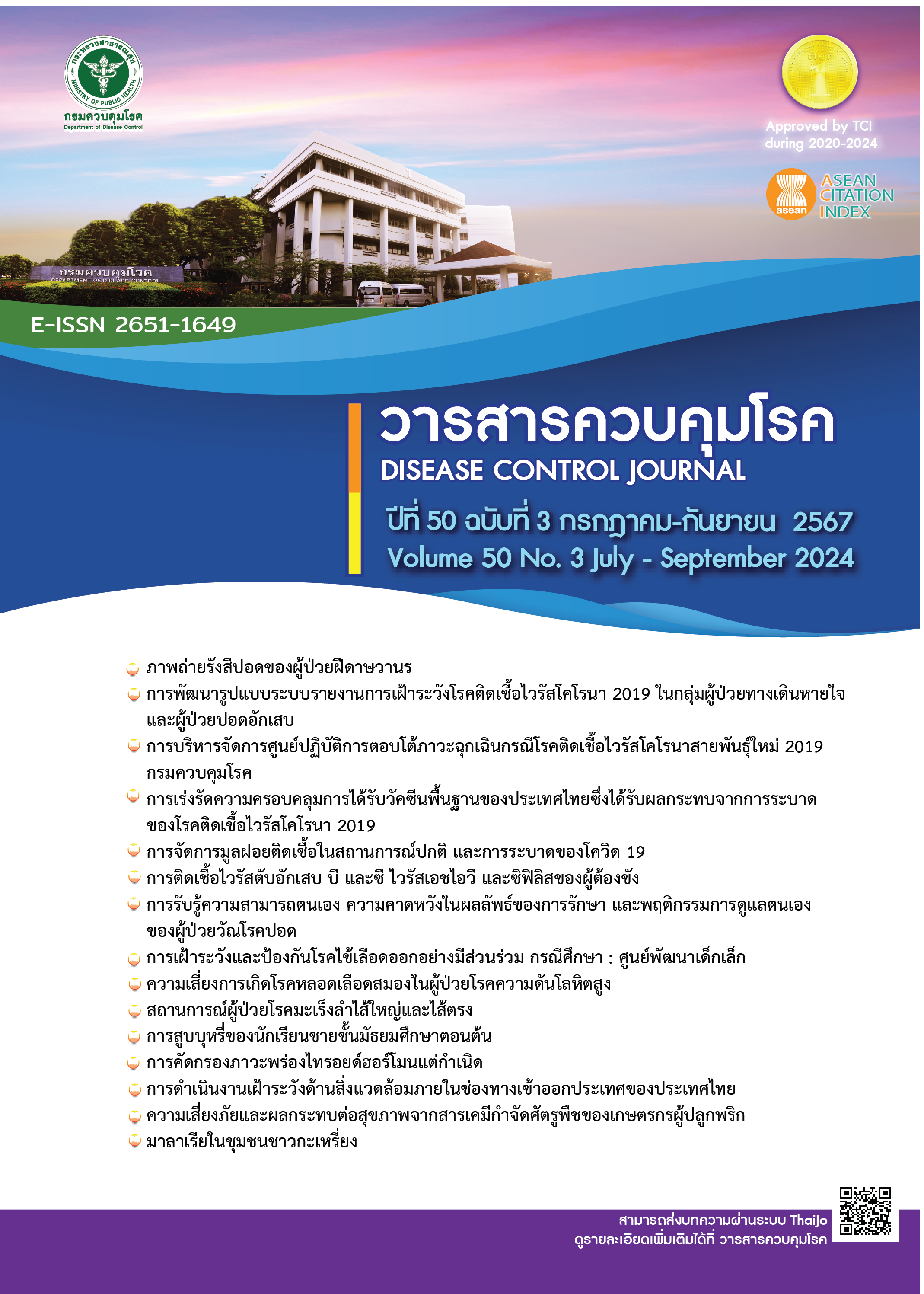Prevalence and risk factors of hepatitis B, hepatitis C, HIV and syphilis among inmates in Udon Thani Provincial Prison
DOI:
https://doi.org/10.14456/dcj.2024.37Keywords:
hepatitis B and C virus, HIV, syphilis, infections in prisonersAbstract
Hepatitis B, hepatitis C, HIV and syphilis are common infections among prisoners. Incarceration setting is suitable for a screening program. This descriptive cross-sectional study, which performed blood screening from May to October 2022, aimed to assess prevalence, and risk factors associated with these infections in all prisoners of Udon Thani Provincial Prison. Total of 90.36% of 3,466 inmates were voluntarily enrolled. Prevalence of hepatitis B, hepatitis C, HIV and syphilis were 5.17%, 1.76%, 1.05%, and 2.65%, respectively. Prisoners who were born before 1992 are common risk factor of hepatitis B, hepatitis C and HIV. Important risk factor for hepatitis B is concurrent Anti-HIV AB+ (AOR=4.13, 95% CI:1.65-10.32); for hepatitis C, the most common risk factor is injection drug use (AOR=17.65, 95% CI:8.76-35.55); for HIV is HIV-positive sexual partners (AOR=86.73, 95% CI:21.11-356.43), and for syphilis is tattoos and body piercings (AOR=2.17, 95% CI:1.14-4.14). Screening and early treatment for all prisoners will reduce prison and household transmission, which in turn will help reduce overall infection rates at a national level.
Downloads
References
Seyed AS, Pashaei Z, Rahimi E, Saeidi S, Mirzapour P, Noori T, et al. Prevalence of sexually transmitted infections and associated risk behaviors in prisoners: A systematic review. Health Sci Rep 2022;5(5):e819.
Dolan K, Wirtz AL, Moazen B, Ndeffo-mbah M, Galvani A, Kinner SA, et al. Global burden of HIV, viral hepatitis, and tuberculosis in prisoners and detainee. Lancet 2016;388:1089-102.
Jatapai A, Nelson KE, Chuenchitra T, Kana K, Eiumtrakul S, Sunantarod E, et al. Prevalence and risk factors for hepatitis C virus infection among young Thai men. Am J Trop Med Hyg 2010;83(2):433-9.
Sunanchaikan S, Theamboonlers A, Chongsrisawat V, Yoocharoen P, Thamaphompilas P,Warinathien P, et al. Seroepidemiology and genotypes of hepatitis C virus in Thailand. Asian Pac J Allergy Immunol 2007;25:175-82.
Wasitthankasem R, Posuwan N, Vichaiwattana P, Theamboonlers A, Kinfueng S, Vuthitanachot V, et al. Decreasing Hepatitis C virus infection in Thailand in the past decade: evidence from the 2014 national survey. Plos One 2016;11(2):e0149362.
World Health Organization. Combating Hepatitis B and C to reach elimination by 2030. Geneva: World Health Organization; 2016.
Wirtz AL, Yeh PT, Flath NL, Beyrer C, Dolan K. HIV and Viral Hepatitis Among Imprisoned Key Populations. Epidemiol Rev 2018;40(1):12-26.
Bhattacharya D, Aronsohn A, Price J, Lo Re V. AASLD-IDSA HCV Guidance Panel. Hepatitis C Guidance 2023 Update: AASLD-IDSA Recommendations for Testing, Managing, and Treating Hepatitis C Virus Infection. Clin Infect Dis 2023;ciad319.
Pawlotsky J-M, New hepatitis C virus (HCV) drugs and the hope for a cure: concepts in anti-HCV drug development.Semin Liver Dis 2014;34:022-9.
UNAIDS.data from country factsheets of Thailand [Internet]. 2019 [cited 2021 Jan 24]. Available from: https://www.Org/en/regionscountries/countries/Thailand.
Thaisri H, Lerwitworapong J, Vongsheree S, Sawanpanyalert P, Chadbanchachai C, Rojanawiwat A, et al. HIV infection and risk factors among Bangkok prisoners, Thailand: a prospective cohort study. BMC Infect Dis 2003;3:25.
Ahmadi GH, Fararouei M, Mirzazadeh A, Sharifnia G, Rohani-Rasaf M, Bastam D, et al. The global and regional prevalence of hepatitis C and B co-infections among prisoners living with HIV: a systematic review and meta-analysis. Infect Dis Poverty 2021;10(1):93.
Mehmandoost S, Khezri M, Mousavian G, Tavakoli F, Mehrabi F, Sharifi H, et al. Prevalence of HIV, hepatitis B virus, and hepatitis C virus among incarcerated people in Iran: a systematic review and meta-analysis. Public Health 2022;203:75-82.
Department of Disease Control (TH), Division of Epidemiology. Syphilis [Internet]. Nonthaburi: Division of Epidemiology; 2022 [cited 2022 Apr 29]. Available from: http://doe.moph.go.th/surdata/disease.php?ds=37 (in Thai)
Chaisongkram N. Epidemiological characteristics among patients with syphilis in Thailand. Dis Control J [Internet]. 2023 Mar 25 [cited 2024 Apr 15];49(1):51-6. Available from: https://he01.tci-thaijo.org/index.php/DCJ/article/view/254310
Department of Disease Control (TH), Division of Innovation and Research. Strategic plan of development of innovation, research and knowledge management for disease prevention and control in Thailand: 2023-2027. 2022. (in Thai)
Harnpariphan W, Han WM, Supanun R, Ubolyam S, Sophonphan J, Ueaphongsukkit T, et al. High proportion of blood-borne and sexually transmitted infections among people deprived of liberty in a central male prison in Thailand: A cross-sectional study 2018-2019.AIDS Res Hum Retroviruses 2022;38(5):370-7.
National Institute on Drug Abuse (NIDA). Methamphetamine [Internet]. [ cited 2019 Dec 22]. Available from: https://www.drugabuse.gov/publications/drugfacts/methamphetamine
Tressler SR, Kushner T, Bhandari R. Factors associated with hepatitis B exposure among people who report using methamphetamine: National health and nutrition examination survey 2009-2016. J Infect Dis 2020;221(2):243-50.
Shetty V, Mooney LJ, Zigler CM, Belin TR, Murphy D, Rawson R. The relationship between methamphetamine use and increased dental disease. J Am Dent Asso 2010;141(3):307-18.
Leroi C, Adam P, Khamduang W, Kawilapat S, Ngo-Giang-Huong N, Ongwandee S, et al. Prevalence of chronic hepatitis B virus infection in Thailand: a systematic review and meta-analysis. Int J Infect Dis 2016;51:36-43.
Magri MC, Nunes AK, Dantas BP, Manchiero C, Prata TVG, Alves GM, et al. Meta-Analysis of the prevalence of HBV infection among alcohol users worldwide. Alcohol and Alcoholism 2020;55(2):136-43.
Messahel A, Musgrove B. Infective complications of tattooing and skin piercing. Journal of Infection and Public Health 2009;2:7-13.
Downloads
Published
How to Cite
Issue
Section
License
Copyright (c) 2024 Disease Control Journal

This work is licensed under a Creative Commons Attribution-NonCommercial-NoDerivatives 4.0 International License.
Articles published in the Disease Control Journal are considered as academic work, research or analysis of the personal opinion of the authors, not the opinion of the Thailand Department of Disease Control or editorial team. The authors must be responsible for their articles.






